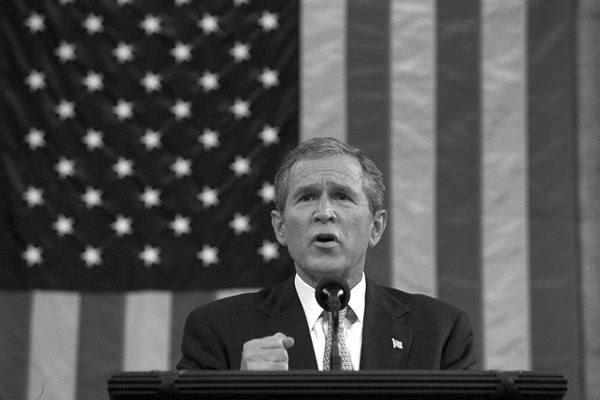
Imagine you’re told that there is an entity out there, something that not only threatens your comfort, freedoms and security, but also society at large. You, they say, must do your part—fight the good fight—or else say goodbye to all that you hold dear. How would you react to such an existential threat to reality as you know it?
First, let us explore an increasingly popular theory in a small but growing area of social psychology, Terror Management Theory. It works like this: suppose we accept that there is an inconsistency between the innate drive for continued survival and the unique understanding of human beings that our lives, regardless of our attempts to postpone the inevitable, are finite. This awareness of our mortality is thought to create an overwhelming sense of existential anxiety that humans attempt to mitigate by adhering to cultural worldviews that exist beyond our physical and temporal selves.
For example, divides in societies often revolve around ideological disputes regarding human rights, environmental responsibility, foreign policy, public spending and cultural differences: all of which reside in a domain outside of individual existence and persist beyond the limits of a human lifetime.
Culture not only creates order and meaning, but also allows one to define his or herself as symbolically part of something that transcends mortality. Accordingly, it seems that humans tend to defend their worldview against those who hold contradictory values, as these opposing ideologies threaten the constructs by which existential terror is managed and minimized.
While this theory appears esoteric and obscure at first, I think it can help to explain a fundamental yet painfully overlooked strategy interwoven throughout the GOP’s discursive posturing. Open any newspaper, magazine or blog, and you’re bound to find some riled-up Republican extolling socially conservative virtues or condemning one act or another as an abomination, a serious threat to your worldview.
Let’s think back to the wonderful era when President George W. Bush and his fantastic policy decisions led us into two offensive wars and effectively pissed-off the entirety of the international community. Just days before the 2004 Presidential Elections, the Bush administration deliberately took actions to increase existential fear: releasing a video of Osama bin Laden to the press, requesting increased vigilance by law enforcement in anticipation of possible life-threatening situations, and using discourse equating the potential election of John Kerry with the increased probability of domestic terrorist attacks.
Suddenly and against all odds, the polls tipped in his favor. With the populace sick and tired of two continual wars that failed to produce positive (or any) results, and the increasing disapproval towards policies that slowly leeched the prized rights to privacy Americans hold so dearly, Bush was ushered back into the White House for another four hard-earned years as commander in chief.
Wait, what? How can such an unpopular president reverse public condemnation and rally voters behind unbelievably stupid and detrimental domestic and foreign policies?
I propose that existential fear played a substantial role in President Bush’s reelection, and is continually utilized to manipulate public opinion and rally support behind the causes taken up by media commentators and politicians alike. Studies have found that existential anxiety, which can be derived from simply flashing the now culturally infamous numbers 9/11, not only could result in Democrats’ increasing support for Republican candidates, but also was able to change the minds of voters who had previously stated they planned to vote for John Kerry in the 2004 Election.
What’s more is that existential anxiety was also found to increase support for aggressive foreign policies, charismatic as opposed to logical argumentation, approval of suicide bombing attacks and derogation of other religions or beliefs.
These findings are derived from just a few of the 250 (and counting) published studies on the role of Terror Management Theory in manipulating personal preferences and voter behaviors. The ramifications of this research are beyond comprehension, potentially undermining the core value of a democratic and liberal society: free will and rational self-directed behavior.
The real question remains: do the figures, Democratic or Republican, who climb up on their soapboxes and shout that the American way of life is under siege by foreign actors and factions within our midst, know the true power of their words?
Whether ignorant ranting is more or less harmful than cold political calculus remains to be seen. Perhaps these politicians do understand the ramifications of declaring Iran, contraception, cuts in military spending, a rising China and the abstract notion of terrorism as grave existential threats, but just in a different way.
One might hope that as educated and self-aware individuals, we should be able to know when we’re being played. Yet the vast majority of Terror Management Theory experiments have taken place on college campuses all over the world. If a population so trained in analytical reasoning and opinionated argumentation can be significantly affected by the invocation of existential fear, I hope for all our sakes that Terror Management Theory remains obscure enough to avoid introduction into the playbooks of democratic politics.
